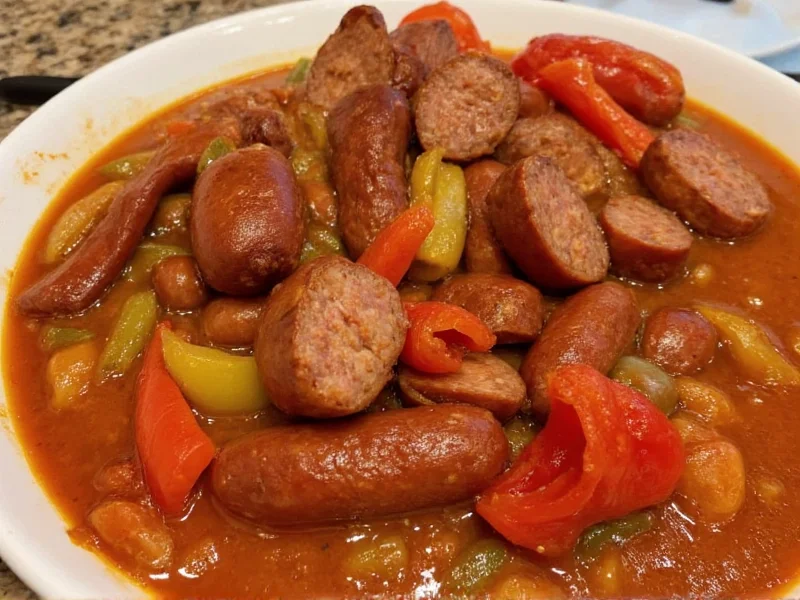Slow cooking sausage and peppers isn't just convenient—it's the secret to achieving restaurant-quality results at home. Unlike quick stovetop methods that can leave sausage dry and vegetables unevenly cooked, the slow cooker's gentle heat gradually breaks down connective tissues in the meat while allowing sweet peppers to develop complex flavors through controlled caramelization.
Why Slow Cooking Elevates Sausage and Peppers
The magic of slow cooking sausage and peppers happens through three key processes: collagen conversion, flavor layering, and moisture retention. As Italian sausage simmers at temperatures between 170-200°F (77-93°C), the collagen in the meat gradually transforms into gelatin, creating that signature fork-tender texture impossible to achieve with faster methods. Simultaneously, the natural sugars in bell peppers undergo controlled caramelization over several hours, developing rich umami notes without burning.
Unlike high-heat techniques that force moisture out of sausage too quickly, the slow cooker's sealed environment maintains optimal humidity. This prevents the proteins from tightening excessively, which is why slow-cooked sausage stays remarkably juicy even after 6 hours. The extended cooking time also allows flavors from fennel seeds, garlic, and oregano to fully permeate every ingredient, creating a unified taste profile rather than distinct competing elements.
Ingredient Selection for Authentic Flavor
Not all sausages perform equally in slow cooking. Fresh Italian sausage with 20-30% fat content provides the ideal balance—leaner varieties become dry while excessively fatty options create an oily sauce. Look for sausages containing fennel seeds, crushed red pepper, and garlic rather than pre-cooked varieties which lack flavor complexity.
For peppers, combine multiple varieties for nuanced sweetness:
| Pepper Type | Sweetness Level | Best Use in Recipe |
|---|---|---|
| Red Bell Peppers | High | Base sweetness, adds color |
| Yellow Bell Peppers | Medium-High | Balanced flavor foundation |
| Orange Bell Peppers | Medium | Complex flavor development |
| Friar Peppers | Medium-Low | Traditional Italian flavor |
Onions matter more than many realize—yellow onions provide the best balance of sweetness and sharpness, while Vidalia onions can become overly sweet. Always slice vegetables uniformly (about ¼-inch thick) to ensure even cooking. For tomatoes, crushed San Marzano tomatoes in puree outperform diced varieties because they distribute flavor more evenly throughout the slow cooking process.
Optimal Slow Cooking Technique
Begin by lightly browning sausage in batches over medium heat—this crucial step develops fond (those flavorful browned bits) without fully cooking the meat. Deglaze the pan with a splash of dry red wine, scraping up all caramelized bits, which forms the flavor foundation. Layer ingredients strategically in your slow cooker: place sliced onions at the bottom to create a natural rack, then arrange browned sausage on top, followed by peppers and garlic.
Pour crushed tomatoes over everything, but resist adding liquid—sausage releases sufficient moisture during cooking. The critical ratio is 1.5 pounds sausage to 3 cups sliced peppers to 1 cup tomatoes. Set your slow cooker to LOW (never HIGH for this dish) and cook undisturbed for 4-6 hours. Resist the urge to lift the lid; each peek releases heat that adds 20 minutes to cooking time.
Avoiding Common Slow Cooker Mistakes
Many home cooks make these critical errors with slow cooked sausage and peppers:
- Overfilling the slow cooker—never fill beyond ⅔ capacity to allow proper heat circulation
- Adding salt too early—wait until the final hour to prevent toughening meat proteins
- Using pre-cooked sausage—smoked or fully cooked varieties become rubbery during extended cooking
- Stirring during cooking—disturbs the natural layering that creates flavor gradients
- Skipping the deglazing step—loses up to 30% of potential flavor development
The visual doneness cues differ from stovetop methods. Properly cooked slow cooker sausage should separate easily with a fork but maintain its cylindrical shape. Peppers should be completely tender but not disintegrated—think "meltingly soft" rather than "mushy." The sauce should coat the back of a spoon without being watery.
Serving and Storage Considerations
For authentic presentation, serve slow cooked sausage and peppers family-style in the slow cooker insert set over a trivet. Provide crusty bread for dipping and a sprinkle of fresh parsley just before serving. The dish improves overnight as flavors continue to meld, making it ideal for meal prep.
When storing leftovers, separate sausage from vegetables to prevent overcooking during reheating. Properly stored in airtight containers, the dish maintains quality for 4 days in the refrigerator or 3 months frozen. Reheat gently in a covered skillet with a tablespoon of water to recreate the slow cooker's moist environment.
Regional Variations Worth Trying
While the classic Italian-American version remains popular, regional adaptations offer exciting alternatives:
- Southern Italian Style: Substitute 'nduja sausage and add roasted eggplant for a Calabrian twist
- New Orleans Variation: Use andouille sausage with Creole seasoning and a splash of Worcestershire sauce
- Vegetarian Adaptation: Replace sausage with portobello mushrooms and white beans, using smoked paprika for depth
- Spicy Arrabbiata Version: Add Calabrian chilis and extra red pepper flakes for heat lovers
Each variation maintains the core slow cooking principle while adapting to different flavor profiles. The key is preserving the 4-6 hour low-temperature cooking window regardless of ingredient changes.
Frequently Asked Questions
- Can I use frozen sausage for slow cooked sausage and peppers?
- Why does my slow cooker version lack the caramelized flavor of restaurant versions?
- How can I thicken the sauce if it's too watery after slow cooking?
- Is it safe to cook raw sausage in a slow cooker without pre-browning?
- What's the ideal slow cooker size for sausage and peppers for 4-6 people?











 浙公网安备
33010002000092号
浙公网安备
33010002000092号 浙B2-20120091-4
浙B2-20120091-4